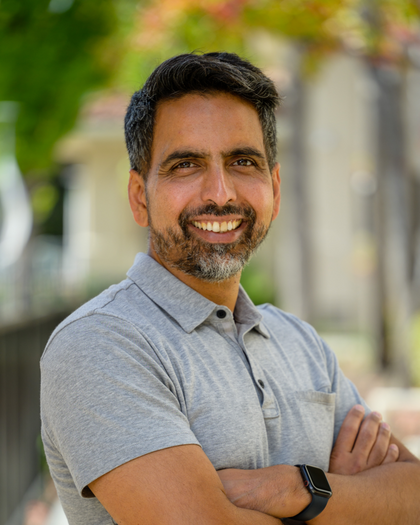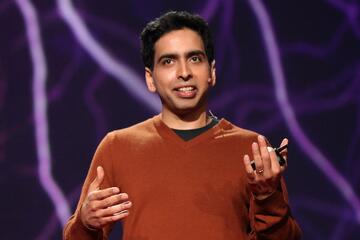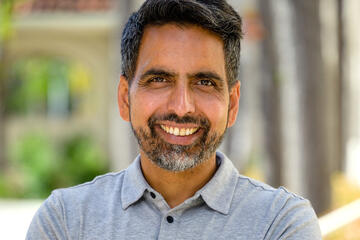Khan Academy founder and CEO Sal Khan, who will serve as the Johns Hopkins University's Commencement speaker later this month, met virtually with a group of about 25 graduating seniors on Friday, May 2, for a special "Ask Me Anything" event.
Khan, a former hedge fund analyst turned educator and entrepreneur, founded Khan Academy in 2008. Since then, the non-profit's online tools, exercises, and videos have helped students around the world, growing to more than 180 million registered users in 190 countries.

Image caption: Sal Khan
In addition to asking questions, AMA attendees told personal stories about growing up with Khan Academy. One senior called the website "instrumental" to his education. Others credited Khan with helping them get into college. Several mentioned how strange it was to hear his familiar voice actually respond to them.
"They said never meet your heroes, but I'm having a great time," said Daniel Ong, who is graduating with a bachelor's degree in chemistry.
Between these candid interactions, Khan shared anecdotes about founding and running an educational non-profit.
"[Khan Academy] is my passion project," he said. "I just kept chipping away until at some point it was hitting me on the head that maybe there's something here."
Here is how Khan responded to select questions during the AMA:
How do you center yourself outside of work?
Khan: Entrepreneurs love their work. They're very passionate. It's not unusual to pull 80-hour weeks or more on your work. But it's always good to have something outside that you're passionate about or that keeps you centered. ... Now the outside thing is my family, which I take very seriously. I try to keep my evenings and my weekends as free as possible, and I feel very fortunate.
My first job out of business school, I worked at a hedge fund. It was a very small hedge fund. It was just me and my boss. The stereotype for something like that is working 80 hours a week. I was psychologically ready to, and I remember, it was like five days into the job, Dan, my boss, said, "Sal, you should go home."
I'm like, "OK, I'll go work from home, Dan." He's like, "No, no, you should just go home and do something else." And I'm like, "What?" Most people in finance, they believe in almost hazing the junior people. But Dan said, "Look, our job as investors is to make a few good decisions every year and to avoid a bunch of bad decisions, and the best way to make good decisions is to have other things in your life. Read, volunteer, do other things, spend time with family, have a broader aperture. The best way to avoid bad decisions is to not overanalyze, to not overwork yourself. I mean, if you're in that 60th or 70th hour and you overanalyze an investment, your judgment is impaired. You're more likely to double down on that bet, even if the data is pointing in the other direction all of a sudden. When your identity is only tied to that one thing, it almost becomes that your ego will do anything to preserve that. And it's not a good place."
So that's what gave me permission, frankly, when my cousins needed me to start tutoring them, to start writing software and making videos on the side. That turned into Khan Academy.
How do you find fulfillment in the day-to-day work?
Khan: I had a friend in high school who's Mormon, and he was going to go on a mission to Brazil to convert people. I remember telling him, "Oh, you have to do that? That's hard." And he's like, "No, I get to do that. I get to do that."
That framing really was powerful for me because almost anything in life, if you just change from, "I have to" to "I get to," it really changes your context. Even when I have really hard days at Khan Academy or something doesn't work out, or there's some people issues or something's struggling with the kids, someone's having a temper tantrum, I'm having an argument, whatever—I try to remind myself how lucky I am to have this problem.
Are there any student success stories that stand out from your time at Khan Academy?
Khan: There's a young girl I just met virtually over Zoom. She's a freshman at MIT from Afghanistan, and the Taliban didn't let her go to school. Khan Academy was her school. We have this other platform, Schoolhouse.world, where ... we have a certification mechanism where you could prove what you know, and even though she never had any formal schooling past elementary school, no high school diploma, MIT accepted her.
As far as I can tell, she's thriving there now. So that's my hope. Obviously, I wish all of these things weren't happening in the world, but at least if we can be a little bit of a safety net, we can make it a little bit less bad.
What is it like being a role model to millions of students?
Khan: I do feel very fortunate and very, very, very, very, very, very lucky. What I get to do in my life, I didn't even know was a thing. It wasn't a thing when I was young. I have to say, it is incredibly rewarding. Even in the early days of Khan Academy, people were sending notes and saying how it's helping them, et cetera. ... But at the same time, my life is a pretty normal life.
Well, I take that back. There are points in my life that are very surreal. ... I was at an event and my wife and I were sitting next to Jerry Seinfeld and his wife. And I was like, Jerry Seinfeld. I don't want that to get old. And it's not every day I'm having dinner next to Jerry Seinfeld, but what was really cool was his wife. She was going to business school, and she's like, "Wait, you're the guy who teaches accounting on YouTube!" I'm like, "Yes, I am." And then she's treating me like I'm the celebrity at the table, and I'm like, your husband's Jerry Seinfeld.
But you know, in my day-to-day I'm dropping off, picking up kids, et cetera. So my kids keep me grounded. My wife keeps me grounded. I do think that's a blessing too. It's the best of both worlds.
Hear more from Sal Khan at Johns Hopkins Commencement 2025.
Posted in Student Life
Tagged commencement, q+a









